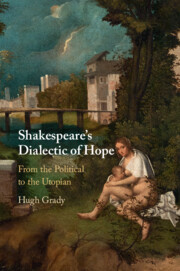
-
Select format
-
- Publisher:
- Cambridge University Press
- Publication date:
- June 2022
- May 2022
- ISBN:
- 9781009106986
- 9781009098090
- 9781009107754
- Dimensions:
- (229 x 152 mm)
- Weight & Pages:
- 0.524kg, 258 Pages
- Dimensions:
- (229 x 152 mm)
- Weight & Pages:
- 0.378kg, 258 Pages
You may already have access via personal or institutional login
Book description
Closely examining the relationship between the political and the utopian in five major plays from different phases of Shakespeare's career, Hugh Grady shows the dialectical link between the earlier political dramas and the late plays or tragicomedies. Reading Julius Caesar and Macbeth from the tragic period alongside The Winter's Tale and Tempest from the utopian end of Shakespeare's career, with Antony and Cleopatra acting as a transition, Grady reveals how, in the late plays, Shakespeare introduces a transformative element of hope while never losing a sharp awareness of suffering and death. The plays presciently confront dilemmas of an emerging modernity, diagnosing and indicting instrumental politics and capitalism as largely disastrous developments leading to an empty world devoid of meaning and community. Grady persuasively argues that the utopian vision is a specific dialectical response to these fears and a necessity in worlds of injustice, madness and death.
Reviews
‘In this stunningly lucid, philosophically astute, and endlessly revealing study, Hugh Grady enlists the utopian and the aesthetic as necessary correctives to any reductively political reading of Shakespeare. This book should be required reading for anyone interested in the evolving meanings of Shakespeare's plays and the legacies of political criticism.'
Julia Reinhard Lupton - The University of California, Irvine
Contents
Metrics
Altmetric attention score
Full text views
Full text views help Loading metrics...
Loading metrics...
* Views captured on Cambridge Core between #date#. This data will be updated every 24 hours.
Usage data cannot currently be displayed.
Accessibility standard: Unknown
Why this information is here
This section outlines the accessibility features of this content - including support for screen readers, full keyboard navigation and high-contrast display options. This may not be relevant for you.
Accessibility Information
Accessibility compliance for the PDF of this book is currently unknown and may be updated in the future.


